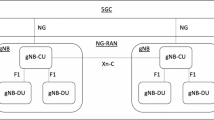Abstract
This paper studies scheduling algorithms for an infra-structure based wireless local area network with multiple simultaneous transmission channels. A reservation-based medium access control protocol is assumed where the base station (BS) allocates transmission slots to the system mobile stations based on their requests. Each station is assumed to have a tunable transmitter and tunable receiver. For this network architecture, the scheduling algorithms can be classified into two categories: contiguous and non-contiguous, depending on whether slots are allocated contiguously to the mobile stations. The main objective of the scheduling algorithms is to achieve high channel utility while having low time complexity. In this paper, we propose three scheduling algorithms termed contiguous sorted sequential allocation (CSSA), non-contiguous round robin allocation (NCRRA) and non-contiguous sorted round robin allocation (NCSRRA). Among these, CSSA schedules each station in contiguous mode, while other two algorithms, NCRRA and NCSRRA, schedule stations in non-contiguous mode. Through extensive analysis and simulation, the results demonstrate that the CSSA with only slightly increased complexity can achieve much higher channel utility when compared to the existing contiguous scheduling algorithms. The NCRRA and NCSRRA on the other hand, results in significantly lower complexity, while still achieving the optimal channel utility compared to existing non-contiguous scheduling algorithms.
Similar content being viewed by others
References
I. Aad and C. Castelluccia, Differentiation mechanisms for IEEE 802.11, in: Proceedings of IEEE INFOCOM (April 2001) pp. 209–218.
W.P. Atikom, P. Krishnamurthy and S.B. Jee, Distributed mechanisms for quality of service in wireless LANs, IEEE Wireless Communications 10 (2003) 26–34.
M. Barry, A.T. Campbell and A. Veres, Distributed control algorithms for service differentiation in wireless packet networks, in: Proceedings of IEEE INFOCOM (April 2001) pp. 582–590.
V. Bharghavan, S. Lu and T. Nandagopal, Fair queuing in wireless networks: Issues and approaches, IEEE Personal Communications (now IEEE Wireless Communications) 6 (1999) 44–53.
F. Cali, M. Conti and E. Gregori, Dynamic tuning of the IEEE 802.11 protocol to achieve a theoretical throughput limit, IEEE/ACM Transactions on Networking 8 (2000) 785–799.
E. Coffman, M.R. Garey and D.S. Johnson, An application of bin-packing to multiprocessor scheduling, SIAM Journal on Computing 7 (1978) 1–17.
S. Damodaran and K.M. Sivalingam, Scheduling algorithms for multiple channel wireless local area networks, Computer Communications 25 (2002) 1305–1314.
M.R. Garey and D.S. Johnson, Computers and Intractability: A Guide to the Theory of NP-Completeness (W.H. Freeman and Co., New York, 1979).
J.A. Hoogeveen, J.K. Lenstra and B. Veltman, Three, four, five, six or the complexity of scheduling with communication delay, Technical Report BS-R9229, ISSN 0924-0659, CWI, Netherlands, 1992.
IEEE standard for Wireless LAN Medium Access Control (MAC) and Physical Layer (PHY) Specifications, ISO/IEC 8802-11:1999(E) (August 1999).
S. Lu, V. Bharghavan and R. Srikant, Fair scheduling in wireless packet networks, IEEE/ACM Transactions on Networking 7 (1999) 473–489.
T.S.E. Ng, I. Stoica and H. Zhang, Packet fair queueing algorithms for wireless networks with location-dependent errors, in: Proceedings of IEEE INFOCOM (March 1998) pp. 1103–1111.
T.S. Rappaport, Wireless Communications Principles and Practice, (Prentice Hall Inc., 1996).
K.M. Sivalingam, J.-C. Chen, P. Agrawal and M. Srivastava, Design and analysis of low-power access protocols for wireless and mobile ATM networks, ACM/Baltzer Wireless Networks 6 (2000) 73–87.
N.H. Vaidya, P. Bahl and S. Gupta, Distributed fair scheduling in a wireless LAN, in: Proceedings of Sixth Annual International Conference on Mobile Computing and Networking (August 2000).
C. Wang, B. Li, B. Li and K. Sohraby, An effective collision resolution mechanism for wireless LAN, in: Proceedings of The 2003 International Conference on Computer Networks and Mobile Computing (ICCNMC-03) (October 2003) pp. 18–25.
Author information
Authors and Affiliations
Corresponding author
Additional information
Chonggang Wang received a B.Sc. (honors) degree from Northwestern Polytechnic University, Xi'an, China, in 1996, and M.S. and Ph. D. degrees in communication and information system from University of Electrical Science and Technology in China, Chengdu, China, and Beijing University of Posts and Telecommunications, Beijing, China, in 1999 and 2002, respectively. From September 2002 to November 2003 he has been with the Hong Kong University of Science and Technology, Hong Kong, where he is an associate researcher in the Department of Computer Science. He is now a post-doctoral research fellow in University of Arkansas, Arkansas. His current research interests are in wireless networks with QoS guarantee, sensor networks, peer-to-peer and overlay networks.
Bo Li received the B.S. (summa cum laude) and M.S. degrees in the Computer Science from Tsinghua University, Beijing, P. R. China, in 1987 and 1989, respectively, and the Ph.D. degree in the Electrical and Computer Engineering from University of Massachusetts at Amherst in 1993. Between 1994 and 1996, he worked on high performance routers and ATM switches in IBM Networking System Division, Research Triangle Park, North Carolina. Since January 1996, he has been with Computer Science Department, the Hong Kong University of Science and Technology, where he is an associated professor and co-director for the ATM/IP cooperate research center, a government sponsored research center. Since 1999, he has also held an adjunct researcher position at the Microsoft Research Asia (MSRA), Beijing, China. His current research interests include wireless mobile networking supporting multimedia, video multicast and all optical networks using WDM, in which he has published over 150 technical papers in referred journals and conference proceedings. He has been an editor or a guest editor for 16 journals, and involved in the organization of about 40 conferences. He was the Co-TPC Chair for IEEE Infocom'2004. He is a member of ACM and a senior member of IEEE.
Krishna M. Sivalingam (ACM ‘93) is an Associate Professor in the Dept. of CSEE at University of Maryland, Baltimore County. Previously, he was with the School of EECS at Washington State University, Pullman from 1997 until 2002; and with the University of North Carolina Greensboro from 1994 until 1997. He has also conducted research at Lucent Technologies' Bell Labs in Murray Hill, NJ, and at AT&T Labs in Whippany, NJ. He received his M.S. and Ph.D. degrees in Computer Science from State University of New York at Buffalo in 1990 and 1994 respectively; and his B.E. degree in Computer Science and Engineering in 1988 from Anna University, Chennai (Madras), India. While at SUNY Buffalo, he was a Presidential Fellow from 1988 to 1991. His research interests include wireless networks, optical wavelength division multiplexed networks, and performance evaluation. He holds three patents in wireless networks and has published several research articles including more than twenty-five journal publications. He has published an edited book on Wireless Sensor Networks in 2004 and on optical networks in 2000 and in 2004. He is a member of the Editorial Board for ACM Wireless Networks Journal, IEEE Transactions on Mobile Computing, and KICS Journal of Computer Networks. He has served as a Guest Co-Editor for special issues of ACM MONET on “Wireless Sensor Networks” in 2003 and 2004 and an issue of IEEE Journal on Selected Areas in Communications on optical WDM networks (2000). He is co-recipient of the Best Paper Award at the IEEE International Conference on Networks 2000 held in Singapore. His work has been supported by several sources including AFOSR, NSF, Cisco, Intel and Laboratory for Telecommunication Sciences. He is a member of the Editorial Board for ACM Wireless Networks Journal, IEEE Transactions on Mobile Computing, and KICS Journal of Computer Networks. He is serving as Technical Program Co-Chair for the First IEEE Conference on Sensor Communications and Networking to be held in Santa Clara, CA in 2004. He has served as General Co-Chair for SPIE Opticomm 2003 (Dallas, TX) and for ACM Intl. Workshop on Wireless Sensor Networks and Applications (WSNA) 2003 held on conjunction with ACM MobiCom 2003 at San Diego, CA. He served as Technical Program Co-Chair of SPIE/IEEE/ACM OptiComm conference at Boston, MA in July 2002; and as Workshop Co-Chair for WSNA 2002 held in conjunction with ACM MobiCom 2002 at Atlanta, GA in Sep 2002. He is a Senior Member of IEEE and a member of ACM.
Kazem Sohraby received the BS, MS and PhD degrees in electrical engineering and the MBA from the Wharton School, University of Pennsylvania, Philadephia. He is a Professor of the Electrical Engineering Department, College of Engineering, University of Arkansas, Fayetteville. Prior to that, he was with Bell Laboratories, Holmdel, NJ. His areas of interest include computer networking, signaling, switching, performance analysis, and traffic theory. He has over 20 applications and granted patents on computer protocols, wireless and optical systems, circuit and packet switching, and on optical Internet. He has several publications, including a book on The Performance and Control of Computer Communications Networks (Boston, MA: 1995). Dr Sohraby is a Distinguished Lecturer of the IEEE Communications Society, and serves as its President's representative on the Committee on Communications and Information Policy (CCIP). He served on the Education Committee of the IEEE Communications Society, is on the Editorial Boards of several publications, and served as Reviewer and Panelist with the National Science Foundation, the US Army and the Natural Sciences and Engineering Research Council of Canada.
Rights and permissions
About this article
Cite this article
Wang, C., Li, B., Sivalingam, K. et al. Scalable Multiple Channel Scheduling with Optimal Utility in Wireless Local Area Networks. Wireless Netw 12, 189–198 (2006). https://doi.org/10.1007/s11276-005-5266-y
Published:
Issue Date:
DOI: https://doi.org/10.1007/s11276-005-5266-y




